PRC shows no crisis is enough to deter them from helping

PRICE LIST People taking COVID-19 tests at the Philippine Red Cross may now submit their saliva as specimen as the agency launches on Monday a cheaper alternative to the reverse transcription polymerase chain reaction testing through swabbing. INQUIRER file photo / NIÑO JESUS ORBETA.
MANILA, Philippines — The year 2020 will go down in history as the start of a shift in lifestyle across the globe as the COVID-19 pandemic disrupted normalcy and left people anxious about the future.
But for Filipinos, the misfortunes of 2020 did not start — and end — with the health crisis: there was the eruption of Taal Volcano, and the subsequent typhoons come October. Still, the Philippine Red Cross (PRC), the premier humanitarian organization in the country, showed that no crisis is big enough to deter them from helping other people.
On the World Red Cross and Red Crescent Day, PRC boasted of its accomplishments through 2020 as it looks to continue striving for betterment of Filipinos.
Despite having their hands full with the eruption of Taal Volcano in January 2020, PRC noted that they immediately shifted their attention to the COVID-19 pandemic, being responsible for a huge number of tests initially done in the country.
“PRC was unstoppable in procuring and transporting equipment and materials required in a lockdown scenario where there were no regular flights. The simple solution: charter planes to bring in the machineries, the test kits and the other equipment critically needed. The first laboratory was built in 10 days,” PRC said in a statement on Friday.
“The test labs soon got their baptism of fire as tens of thousands of returning residents had to be tested in addition to the tens of thousands who had never left the country but similarly had to be tested […] In November, a little over 6 months after the opening of the first laboratory, PRC had performed One Million Tests,” it added.
According to PRC, the are responsible for around 25 percent of “all the tests done in the country” through 13 molecular laboratories throughout the country.
However, the organization said that its chairperson, Senator Richard Gordon, was not satisfied with these accomplishments as their vision was to help people amid the crisis and make testing accessible to those who may need it — bringing life to the saliva-based COVID-19 testing.
“He wanted testing to be made available to as many of the population that needed it. Testing had to be democratized, to be made more affordable. With the help of scientists from the University of Illinois and University of the Philippines, PRC introduced and developed saliva RT-PCR testing in the country, a less invasive, more economical, but still an effective alternative to oro and naso pharyngeal swabbing,” PRC noted.
“Apart from PRC Molecular Laboratories, the PRC initiated a whole gamut of COVID-19 responses to alleviate human suffering and uplift human dignity: from the distribution of facemasks, PPEs, and cadaver bags; establishment of the 1158 hotline of PRC; to the provision of negative pressure ambulance services, cash grants, food packs, hot meals, hygiene kits, water, hand washing facilities, and psychosocial support,” it added.
Aside from the Taal Volcano eruption and COVID-19, PRC also responded to the consecutive typhoons that battered Eastern Visayas, Bicol Region, Cagayan Valley, and parts of Mega Manila from late October to early November. They also ensured that usual PRC services apart from calamities — like providing vaccines against measles and polio — would continue.
“The Red Cross and Red Crescent Societies have gone a long way from 158 years ago, when the Red Cross was established by Henry Dunant following the battle of Solferino. Now, the 192 Red Cross National Societies provide humanitarian services not only during times of war but also in disasters, emergencies, and pandemics,” PRC said.
“The Philippine Red Cross under the leadership of Chairman Gordon has done well. Despite limited resources, it has graduated into the big leagues of super Red Cross Societies that are able to effectively alleviate human suffering and assist the most vulnerable at all times,” it added.